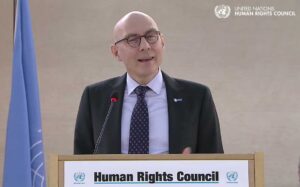Sikhs Worldwide Take Diplomatic Leap to UN Over India’s Human Rights
In a significant diplomatic maneouvre, Sikhs from 40 countries, spanning from Afghanistan to the United States, rallied together to address the “deteriorating human rights situation in India” with the unprecedented step of appealing directly to the United Nations, focusing their efforts on the immediate appointment of a Special Rapporteur dedicated to monitoring and reporting in the region. WSN reports.
![In a significant diplomatic maneouvre, Sikhs from 40 countries, spanning from Afghanistan to the United States, rallied together to address the “deteriorating human rights situation in India” with the unprecedented step of appealing directly to the United Nations, focusing their efforts on the immediate appointment of a Special Rapporteur dedicated to monitoring and reporting in the region. WSN reports. Debunking India’s refrain about the role of the Indian state in committing human rights abuse, a Sikh delegation presented an exhaustive […]](https://www.theworldsikhnews.com/wp-content/uploads/2023/10/Sikh-delegation-at-the-UN-360x267.jpg)
Debunking India’s refrain about the role of the Indian state in committing human rights abuse, a Sikh delegation presented an exhaustive memorandum to the United Nations High Commissioner for Human Rights -Mr. Volker Türk, conducted a rally at the Geneva headquarters of the UN, emphasizing the grim state of civil and political rights in contemporary India.
The memorandum submitted by the leaders of the joint global effort, cited both historical and recent events, including the statement by Canadian Prime Minister Justin Trudeau in the Canadian Parliament on 18 September 2023. Clearly, Trudeau’s comments, which alleged Indian government involvement in the assassination of Sikh leader Hardeep Singh Nijjar on Canadian soil, have reignited the global spotlight on India’s human rights records, particularly those concerning the Sikh community. His comments have thrown into stark relief concerns over India’s respect for the rule of law and sovereignty of other nations.
 It would be interesting to see how the UN High Commissioner for Human Rights -Volker Türk -an ace UN specialist responds to the plea of the Sikhs, particularly in light of the attention that the Sikh cause garnered last month after leaders globally from Canada to the USA and the international media highlighted the Sikh struggle for rights.
It would be interesting to see how the UN High Commissioner for Human Rights -Volker Türk -an ace UN specialist responds to the plea of the Sikhs, particularly in light of the attention that the Sikh cause garnered last month after leaders globally from Canada to the USA and the international media highlighted the Sikh struggle for rights.
The Sikhs, residing in countries as diverse as Afghanistan, Australia, Austria, Belgium, Canada, China, Cyprus, Denmark, Fiji, Finland, France, Germany, Greece, India, Indonesia, Ireland, Italy, Kenya, Kuwait, Malaysia, Mexico, Nepal, Netherlands, New Zealand, Norway, Pakistan, Philippines, Poland, Portugal, Russia, Singapore, South Africa, Spain, Sweden, Switzerland, Tanzania, Thailand, United Arab Emirates, United Kingdom, and the United States of America, have unified in their mission. Their collective voice is intended to amplify concerns about alleged extrajudicial killings, discrimination against minorities, and an overarching narrative of India’s drift from democracy to autocracy.
Last week, Sikh representatives from across the world held a rally outside the United Nations in Geneva to raise concerns over what they term the “deteriorating human rights situation in India.” Participants at the rally aimed to highlight not just past injustices but recent developments that suggest intensified Indian government interference in foreign countries, especially targeting Sikh activists advocating for a Sikh homeland.
Their outreach to the UN includes a series of complaints and requests, from seeking investigations into specific incidents like the assassination of Hardeep Singh Nijjar to broader appeals such as the designation of a Special Rapporteur on the human rights situation in India.
The Sikh Federation UK which coordinated with Sikhs across countries told media persons that they had submitted complaints to the Special Procedures, addressing the extrajudicial killing of Hardeep Singh Nijjar and the mysterious disappearance of Jaswant Singh Khalra.
“The Sikh Federation UK has also reached out to the Office on Genocide Prevention, the Responsibility to Protect, and the International Criminal Court.”
“We have submitted complaints to the Special Procedures, addressing the extrajudicial killing of Hardeep Singh Nijjar and the mysterious disappearance of Jaswant Singh Khalra.”
The memorandum also sheds light on historic atrocities, including the 1984 Sikh Genocide, which has been recognized by the current Indian government and its courts. It emphasizes the need for global acknowledgment and efforts to prevent any reoccurrence.
This collective effort by Sikhs across the globe represents an extensive diplomatic campaign, leveraging global institutions to ensure justice and protect human rights for the Sikhs.
As India approaches its 2024 general elections, the international community will likely be watching closely, with this diplomatic move by the Sikhs worldwide, adding to the pressure for transparency and accountability.
